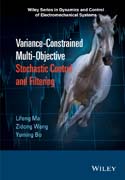
Variance-Constrained Multi-Objective Stochastic Control and Filtering
Ma, Lifeng
Wang, Zidong
Bo, Yuming
Unifies existing and emerging concepts concerning multi–objective control and stochastic control with engineering–oriented phenomena Establishes a unified theoretical framework for control and filtering problems for a class of discrete–time nonlinear stochastic systems with consideration to performance Includes case studies of several nonlinear stochastic systems Investigates the phenomena of incomplete information, including missing/degraded measurements, actuator failures and sensor saturations Considers both time–invariant systems and time–varying systems Exploits newly developed techniques to handle the emerging mathematical and computational challenges INDICE: Preface vii.Acknowledgements ix.List of Abbreviations xi.1 Introduction 1.1.1 Analysis and Synthesis of Nonlinear Stochastic Systems 2.1.1.1 Nonlinear Systems 3.1.1.2 Stochastic Systems 4.1.2 Multi–Objective Control and Filtering with Variance Constraints 5.1.2.1 Covariance Control Theory 5.1.2.2 Multiple Performance Requirements 7.1.2.3 Design Techniques for Nonlinear Stochastic Systems with Variance Constraints 9.1.2.4 A Special Case of Multi–Objective Design: Mixed H2/H1 Control/Filtering 11.1.3 Outline 12.2 Robust H1 Control with Variance Constraints 17.2.1 Problem Formulation 18.2.2 Stability, H1 Performance and Variance Analysis 20.2.2.1 Stability, H1 Performance Analysis 21.2.2.2 Variance Analysis 23.2.3 Robust Controller Design 27.2.4 Numerical Example 30.2.5 Summary 33.3 Robust Mixed H2=H1 Filtering 41.3.1 System Description and Problem Formulation 42.3.2 Algebraic Characterizations for Robust H2=H1 Filtering 44.3.2.1 Robust H2 Filtering 44.3.2.2 Robust H1 Filtering 50.3.3 Robust H2=H1 Filter Design Techniques 51.3.4 An Illustrative Example 60.3.5 Summary 62.4 Filtering with Missing Measurements 63.4.1 Problem Formulation 64.4.2 Stability and Variance Analysis 67.4.3 Robust Filter Design 71.4.4 Numerical Example 75.4.5 Summary 78.5 Robust Fault–Tolerant Control 87.5.1 Problem Formulation 88.5.2 Stability and Variance Analysis 90.5.3 Robust Controller Design 92.5.4 Numerical Example 98.5.5 Summary 103.6 Robust H2 SMC 105.6.1 The System Model 106.6.2 Robust H2 Sliding Mode Control 107.6.2.1 Switching Surface 107.6.2.2 Performances of the Sliding Motion 108.6.2.3 Computational Algorithm 114.6.3 Sliding Mode Controller 115.6.4 Numerical Example 116.6.5 Summary 118.7 Dissipative Control with Degraded Measurements 125.7.1 Problem Formulation 126.7.2 Stability, Dissipativity and Variance Analysis 129.7.3 Observer–Based Controller Design 134.7.3.1 Solvability of Multi–Objective Control Problem 134.7.3.2 Computational Algorithm 139.7.4 Numerical Example 140.7.5 Summary 142.8 Variance–Constrained H1 Control with Multiplicative Noises 145.8.1 Problem Formulation 146.8.2 Stability, H1 Performance, Variance Analysis 147.8.2.1 Stability 148.8.2.2 H1 performance 150.8.2.3 Variance analysis 152.8.3 Robust State Feedback Controller Design 153.8.4 A Numerical Example 156.8.5 Summary 157.9 Robust Finite–Horizon H1 Control 159.9.1 Problem Formulation 160.9.2 Performance Analysis 162.9.2.1 H1 Performance 162.9.2.2 Variance Analysis 164.9.3 Robust Finite Horizon Controller Design 167.9.4 Numerical Example 171.9.5 Summary 173.10 Finite–Horizon Filtering with Degraded Measurements 177.10.1 Problem Formulation 178.10.2 Performance Analysis 181.10.2.1 H1 Performance Analysis 181.10.2.2 System Covariance Analysis 186.10.3 Robust Filter Design 187.10.4 Numerical Example 190.10.5 Summary 191.11 Mixed H2=H1 Control with Randomly Occurring Nonlinearities: the Finite–Horizon Case 197.11.1 Problem Formulation 199.11.2 H1 Performance 200.11.3 Mixed H2=H1 Controller Design 204.11.3.1 State–Feedback Controller Design 204.11.3.2 Computational Algorithm 207.11.4 Numerical Example 207.11.5 Summary 211.12 Finite–Horizon H2=H1 Control of MJSs with Sensor Failures 213.12.1 Problem Formulation 214.12.2 H1 Performance 216.12.3 Mixed H2=H1 Controller Design 220.12.3.1 Controller Design 220.12.3.2 Computational Algorithm 224.12.4 Numerical Example 224.12.5 Summary 227.13 Finite–Horizon Control with ROSF 229.13.1 Problem Formulation 230.13.2 H1 And Covariance Performances Analysis 234.13.2.1 H1 Performance 234.13.2.2 Covariance Analysis 238.13.3 Robust Finite–Horizon Controller Design 240.13.3.1 Controller Design 240.13.3.2 Computational Algorithm 243.13.4 Numerical Example 243.13.5 Summary 244.14 Finite–Horizon H2=H1 Control with Actuator Failures 247.14.1 Problem Formulation 248.14.2 H1 Performance 251.14.3 Multi–Objective Controller Design 253.14.3.1 Controller Design 253.14.3.2 Computational Algorithm 256.14.4 Numerical Example 257.14.5 Summary 259.15 Conclusions and Future Topics 261.References 263
- ISBN: 978-1-118-92949-0
- Editorial: Wiley–Blackwell
- Encuadernacion: Cartoné
- Páginas: 336
- Fecha Publicación: 15/05/2015
- Nº Volúmenes: 1
- Idioma: Inglés
